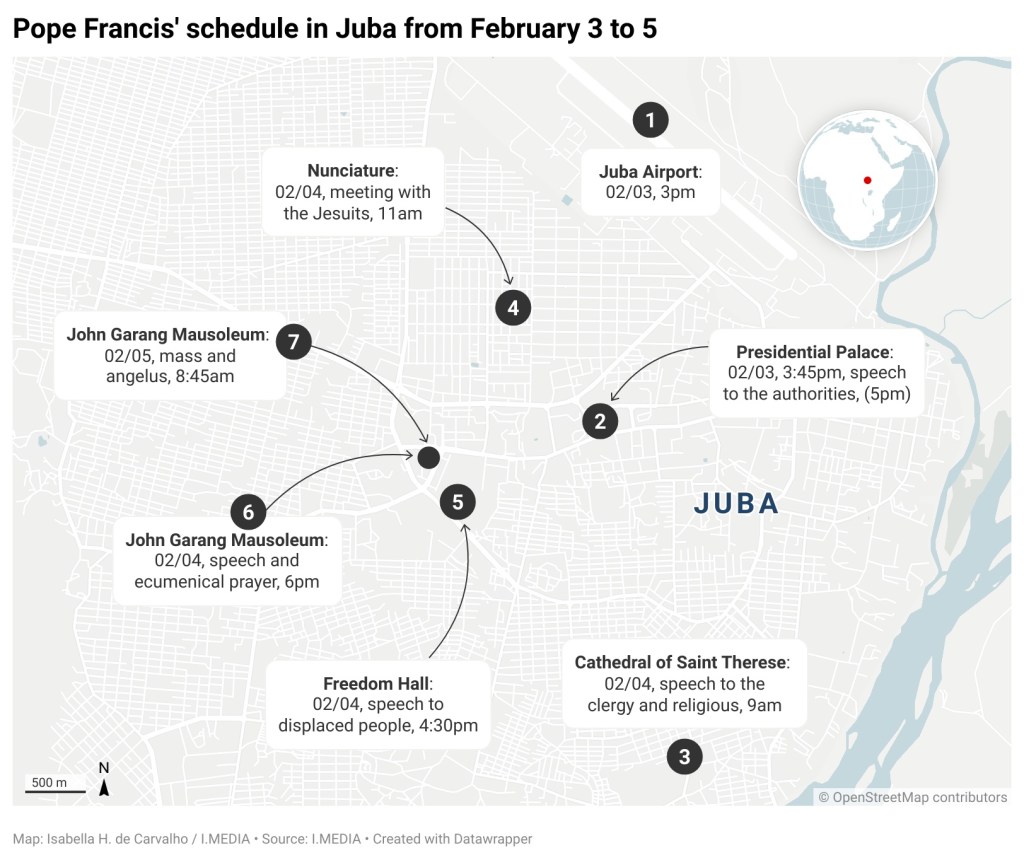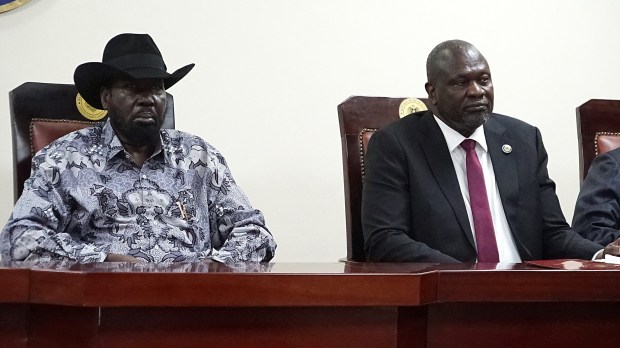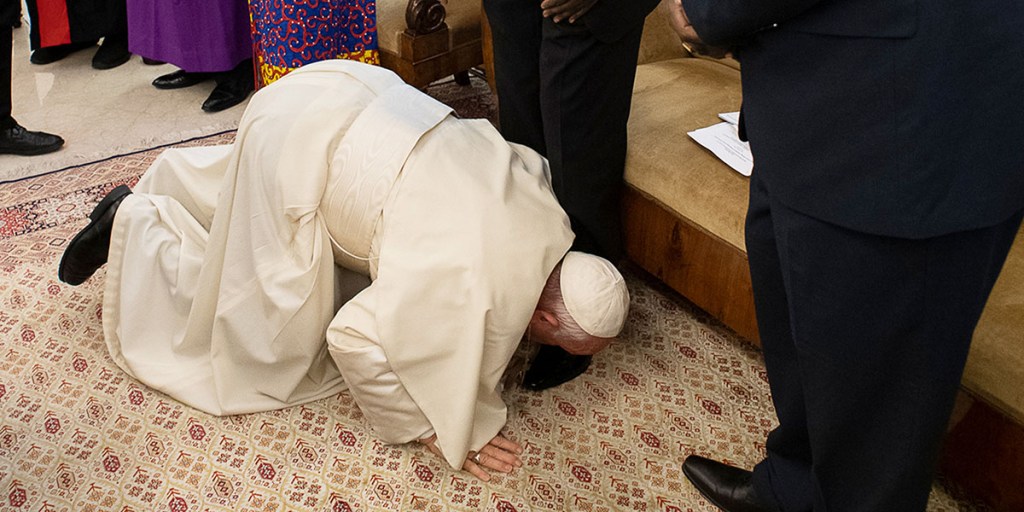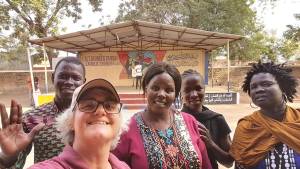It’s more than 4,800 miles from Rome to Juba, South Sudan. But it’s a much further distance to go from standing upright to kneeling down and kissing someone’s feet.
And yet, Pope Francis made such a humble gesture, when South Sudan’s leaders visited him at the Vatican in 2019. In so doing, he seems to have made an even greater distance more within reach – a seemingly unbridgeable gap between the sparring leaders of that African nation, the world’s youngest. South Sudan gained independence from Sudan on July 9, 2011, and has had a rocky road ever since.
Now, Francis will visit those leaders on their home turf, and it wouldn’t be surprising if some of them kiss the Pope’s feet when they first touch South Sudanese soil.
The Pope’s stunning gesture came in April 2019, at the end of a spiritual retreat he and the Archbishop of Canterbury, Justin Welby, hosted at the Vatican for civil and ecclesial leaders in South Sudan.
It was an attempt to overcome hurdles in peace negotiations in the country.
Archbishop Welby, along with Iain Greenshields, Moderator of the General Assembly of the Church of Scotland, will join Pope Francis in South Sudan, a visit that will follow immediately on the Pontiff’s visit to the Democratic Republic of Congo.
The papal visit will “encourage our people to live as brothers and sisters, as people who are created by one God,” said Fr. Samuel Abe, acting secretary general of the Archdiocese of Juba and general coordinator of the Pope’s visit. “The poor people who are suffering are looking forward to a message of solidarity.”
Fr. Abe made his remarks during a January 16 webinar hosted by the international foundation Aid to the Church in Need: “Pope Francis’ trip to the Democratic Republic of Congo and South Sudan: A message of unity and reconciliation in two countries crushed by violence and suffering.”
History of conflict
Pope John Paul II stopped briefly in Khartoum, the capital of Sudan, in 1993. A long civil war between the Islamist regime in the north and Christian and animist rebels in the south finally led to South Sudan’s independence in 2011.
Less than two years after independence, though, a civil war erupted in South Sudan itself. Fueled by personal and ethnic rivalries, the conflict has killed tens of thousands of people.
According to Aleteia’s Miriam Diez Bosch, the war involves a confrontation between the country’s president and vice-president, who come from two different ethnic groups.
“On one hand, there is the Dinka president, Salva Kiir; on the other, the Nuer rebel leader and … vice-president, Riek Machar,” Diez wrote in 2017. Kiir saw Machar’s differences of opinion as a threat to his power and fired him. The international community pressured the two to negotiate, and the conflicting parties signed a peace treaty in August 2015, which created a transitional government in April 2016. Nevertheless, two months later, a conflict broke out again between the two main signers of the accord and their followers.
[In photo at top, Kiir, left, and Machar, right, attend signing ceremony on April 3, 2022.]
Machar fled the country and was eventually detained in South Africa.
“In 2017 and 2018, a series of cease-fires were negotiated and subsequently violated between the two sides and other factions,” the Council on Foreign Relations explains. After almost five years of civil war, Kiir and Machar participated in negotiations mediated by Uganda and Sudan in June 2018. Later that month, Kiir and Machar signed the Khartoum Declaration of Agreement that included a cease-fire and a pledge to negotiate a power-sharing agreement to end the war.
“Despite sporadic violations over the ensuing weeks, Kiir and Machar signed a final cease-fire and power-sharing agreement in August 2018,” says the CFR. “This agreement was followed by a peace agreement to end the civil war signed by the government and Machar’s opposition party, along with several other rebel factions. The agreement, called the Revitalized Agreement on the Resolution of the Conflict in South Sudan, included a new power-sharing structure and reinstated Machar as vice president.”
Even after Machar returned to South Sudan for a nationwide peace celebration to mark the end of the civil war, attacks and violations of the accord continued. By then, an estimated 400,000 people had been killed during five years of war, and nearly 4 million were internally displaced or had fled the country.
Violence also prevented farmers from planting or harvesting crops, causing food shortages nationwide. In July 2014, the UN Security Council declared South Sudan’s food crisis the “worst in the world.” Famine was declared in South Sudan during the first few months of 2017, with nearly 5 million people at risk from food insecurity.

A Pope of hope
South Sudan is predominantly Christian, with Catholics making up about 52% of the population, followed by Anglicans, Presbyterians and other Protestant denominations. According to Vatican News, bishops, missionaries and other Christian leaders have launched countless appeals over the past 10 years for a peaceful solution to the conflict.
“The Church’s commitment for reconciliation is carried out first of all through direct mediation,” Vatican News says. “Local Churches have been involved in facilitating talks since 2013, when Kiir called the Catholic Bishop Emeritus of Torit, Paride Taban, and the Anglican Archbishop Daniel Deng Bul to lead the newly established Committee for the national reconciliation process.”
In 2020, the Italian Catholic Community of Sant’Egidio launched the “Rome Initiative” to bring to the negotiating table the opposition movements that had not subscribed to the Revitalized Peace Agreement of 2018. Negotiations are still ongoing, as ethnic fighting in various areas continues.
The Church has been promoting reconciliation also through projects at the grassroots level aimed at training South Sudanese citizens on the issues of peace and healing, Vatican News added.
“We hope that when the Pope touches the soil of South Sudan, miracles will happen,” said Fr. Samuel Abe, during the Aid to the Church in Need webinar. “The Pope’s visit will have a great impact on us, because the poor people who are suffering are looking forward to a message of solidarity.”



